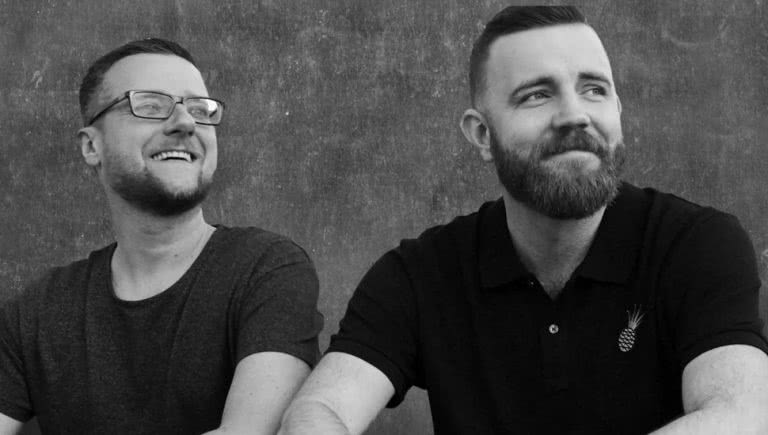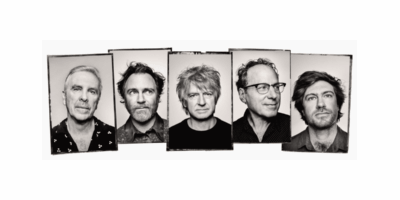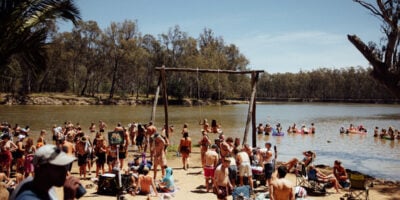Catz ‘n Dogz have been spreading their sound for over 15 years and influenced everyone from near and far with their diverse musical ability.
Grzegorz and Wojciech (Greg and Voitek) Polish producers and owners of Pets Recordings’ are known for their electrifying performances and catchy cuts. They have achieved a stratospheric rise through the ranks and this week release their new album Moments.
The album itself is different from their dance-oriented grooves but is touched with the class that you would expect from the duo and is an homage to the way they are coping with lockdown and their enduring friendship.
They’ve also released weighty remixes for a veritable who’s who in music, electronic or otherwise, including Basement Jaxx, Kings Of Leon, Friendly Fires, Kim Ann Foxman and Thomas Schumacher’s ‘Hush’. Being so busy with the album and all the production work with people like Fat Boy Slim and Duke Dumont, we are very grateful that they were able to sit down with us and chew the fat.
This interview took place a week prior to the Polish elections with Voitek being in Madrid and Greg in Poland. They have been separated from each other for that entire time.
Check out ‘Life’ by Catz ‘n Dogz:

So, gentleman how have you been coping?
Love Music?
Get your daily dose of metal, rock, indie, pop, and everything else in between.
Voitek: Oh good, I went to the gym for the first time in four months today so it was like a celebration.
Greg: It’s actually really bad in Poland at the moment because there’s 500 people infected every day but there is no restriction at all. I think people get really used to it and they don’t wear any protection. So it’s pretty weird and we have presidential elections next week so I think it’s gonna be even worse.
So, let’s take you back to the beginning. You started off your young childhood in communist Poland. How did life change for you and your family after communism collapsed?
V: I will start because I just watched a new movie with Penelope Cruz on Netflix about communism in Cuba. My boyfriend never lived in the communist era, so for people like him it’s really difficult to imagine how it was.
For example, when I tell him thats when we grew up, we didn’t have orange juice or stuff like that he doesn’t have that life experience to compare. Those times shaped us and made us hard working because we are always trying to prove something to the world.
G: Yeah and I think that was a really weird time especially the early ’90s when everything was suddenly possible and there was no wall. When we were still a young democracy there was a lot of crazy stuff going on; a lot of gangsters and corruption. It was just crazy.
We lived in Szczecin which is one and a half hours away from Berlin and 15 minutes from the German border so you can imagine what was happening here. There were a lot of trucks going back and forth because suddenly we had access to everything. Everybody wanted to import cars, TVs, VHS recorders and everything else.
V: It’s really interesting that the biggest label that was releasing in the 90s on cassettes was actually pirate. This label TAKT would sell like 20-30,000 cassettes but it was without any licensing.
G: There was no licensing at all. You could buy games and music which were all pirate. Our laws were evolving when we were a young country. It just happened that way. So that was really interesting when everything changed. The mentality for some people is still the same though, especially with the older generation.
You could buy tapes, Reebok or Adidas shoes at the same place you bought vegetables. So that was really crazy. I’m happy that we lived through this time because as Voitek said, I think we were able to see all the changes which in turn have made us hardworking because we know that when you want to achieve something you need to work at it.
Check out ‘Sunrise (feat. James Yuill)’ by Catz ‘n Dogz:

Except for the radio, which you could hear from over the German border, what were you listening to and was the family in any danger from listening to decadent Western radio?
V: Well, I was lucky enough that my dad worked on a ship and was always bringing new music home. My early education, outside of normal pop music was stuff like Led Zeppelin. My dad was really into that kind of thing. I think personally I can count myself lucky because I was thrown into situations that guided me later to where I am right now.
For example, I was singing in a choir, and even though I didn’t have a rich family, the choir that I was singing in was pretty successful. So, between 12 and 16, I was traveling four times a year to faraway places like LA, or Singapore, Taiwan.
So, I was lucky enough to discover the world even in the 90s when traveling abroad was not normal for Poles. We were lucky as well because we were near Berlin so we were able to watch Music Television and Greg was listening to the radio.
G: There were DJ sets every Saturday night so I was recording everything. There was no danger listening to this kind of radio because by the late ’80s everything had relaxed in Poland. It was not as hardcore like in the ’60s or ’70s… I mean when I was born in ’82 and before that people thought there was going to be a war. Luckily there was not.
V: We were on the cusp of it. So when I became conscious of my surroundings, which was like six or seven years old, we were really out of that era.
So, for me communism was not really that memorable but the early ’90s for me were the crazy times where suddenly we had a free economy. That’s what I remember. It was really weird. You could buy cassette tapes next to potatoes and stuff like that. It was really, really bizarre.
Which one of you bought the Michael Jackson tape from the potato seller?
V: Yeah, that’s me. I still remember exactly the cover of that cassette and the place where I bought it. Techno in the ’90s was very popular in Poland.
There was a national station that would play it called RMF. They would play for four hours from midnight to four. It was called TMM.
It was on too late for me to stay up, so I would record it on cassette. That’s where I first heard about Carl Cox, that’s where I first heard about Josh Wink… For me it was like magic. The first time you got to hear Josh Wink on Ovum Recordings, you’re like freaking out.
Now, electronic music is not the music of the future, it’s the music of the now, so it’s not that weird to listen to it. But in the ’90s it just fuelled my desire to know more.
G: It was also popular because after communism people really wanted to unite, do something together and do something different. So that’s why the big parties were really popular. People felt different and they also felt united in something that was futuristic and something that brought the message of united love and everything. So that’s why it was really big here.
Check out ‘Brunch #12’ with Catz ‘n Dogz:

So, you met in 2002 and started to play out in 2003. What did you learn on? Digital or vinyl?
G: No, when we started there was still no internet. So basically, you needed a modem and a telephone line to connect to the internet and the speeds were so slow that you couldn’t download.
I mean, you could download an mp3 but it was taking a few hours to just get one and there were no CD players in the clubs back then either. So, we started with vinyl and went every few weeks to Berlin to the shops.
G: We were really lucky to experience this culture and we met a lot of people in Berlin because the shops were the cultural exchange. We got to know the music there and talked with people.
That was an amazing time and we were spending all our money. We were playing for the whole night for ten bucks and then back to Berlin to buy the records. So, yeah, we were only buying vinyl back then.
We also started our first record label but this was also vinyl-only because digital was not that popular. When the digital era did come that was an interesting time as well because the perception around music changed.
So, when you started creating music which was under the 3Channel name, what equipment were you using when you were doing that because I wouldn’t have thought technology would have been accessible for you?
V: Pretty crap. Aiwa speakers. The cheapest music program possible. All cracked VST plugins. We didn’t buy anything. Later when we started to make money, we were successively buying the original version of each instrument every few months to give back to the industry.
Honestly, very few people started doing music with purchased plugins but I think it’s quite important to give back to the industry when you make it. So we had a few samples, the simplest software and the shittiest equipment and a lot of motivation.
Check out ‘Time (feat. Jaw)’ by Catz n’ Dogz:

So before Catz ‘n Dogz you were a three piece called 3channels. Do you still see the guy that left and is he like the fifth Beatle?
V: He was a good friend of mine but we had completely different ways of thinking. He was so different from what we are. We turned out to be completely different people. We would DJ at parties and all three of us would argue. It did not make any sense and look how good a decision that turned out to be…
G: And we (me and Voitek) are really good friends. We learned how to work together. It’s like a relationship because we have known each other for 15 years.
How has the music scene evolved in Poland and can it stand its own?
G: The music scene in Poland right now is pretty good. There’s a lot of festivals. The music scene in Poland was really good after communism finished. Then there was a big problem when we joined the European Union.
A lot of creative people left Poland and went to UK, Norway etc for a better life. There were not too many parties then but we were lucky as we got to travel outside of Poland.
G: There’s a lot of really big festivals now, the line-ups are really good; the clubs are really cool. There’s a lot of people really interested in this culture.
The biggest electronic music festival is Audioriver where 50,000 people attend and there’s 12 stages. I think that has developed really well and the quality is also really cool. We are also residents at Smolna club in Warsaw, which has one of the best sound systems we have ever heard.
G: So, yeah, we are lucky. We play a lot in Poland and we have our favourite clubs that we really like to go back to. I think we really earned people’s trust and they really like what we do. It’s sometimes like a concert and we can do whatever we want with the music because people trust us. It’s a really big pleasure for us to play there.

2007 was the year you started on the Catz ‘n Dogz journey. Was there any thought to becoming massive global superstars or was it just a pursuit you were doing and fame and fortune have come by virtue of your hard work.
G: We didn’t want to be big superstars. That was not the point from the beginning. We really wanted to be good producers, and then better producers and better DJs and to travel around the world and play really good parties; that was the main goal.
There was no goal to be famous. At the beginning we didn’t have really big targets. The most important thing for us was to release on good labels with the music that we love. That was the main thing and then Voitek voted move to Berlin and I followed later.
We started to treat everything more professionally then; we got a manager and a booking agency. But at the beginning the most important thing was to have fun, to be creative and to play really good parties.
V: I really don’t envy the kids that are starting now because it’s so much more difficult nowadays. There’s just so many people doing this. When we were starting, we got bookings on the phone, somebody would call and tell you that you gotta be here or there.
It was enough for us to play three four gigs a month and I was already earning more money than my mom would make working in the office. So, honestly, I was just like happy to do it. It was lasting and it was amazing. I never really thought about how I would plan it.
V: [Now it’s different] for example releasing the album. I go on YouTube and I build the campaign and have to do a million things that I need to think about. Back then, honestly, we were just making music, playing records, putting up posters, partying on with people and building contacts. It was just pure curiosity and then we thought, “wow we can do more!”
There was never really like a plan. Of course, when I went to Love Parade and saw someone like Carl Cox, I was like, “fuck, I wish I could play there.” But I never had a strategy like, “okay, I will talk with this guy, this guy, this guy and will put the promo here and put a million euros on this; then I will succeed.” It was never like that. Nowadays I don’t know how you could just make music and become famous.
G: There was one day when we realised our dreams had come true when we played at places like Fabric for example or another really big club; then we were saying to each other, “oh my god we are actually doing this.” But it was just really organic like Voitek says.
So, was it easy?
V: No, no, it’s very important to say this because it was different. When it starts, then you feel amazing with it and you get hungry. Then you carry on for several years.
Then you drain yourself, and you realise fuck, maybe I should also focus on my mental health and the gym. Then you go to the therapist for two years and they tell you that you are alright and then you go and play at Fabric, [laughs].
Check out ‘Listen’ by Catz ‘n Dogz:

So, you had to take that three year break to focus on yourself to go to the next stage?
V: Yeah, you have to pay somebody to tell you that you’re good man. It’s not that different from every other DJ. It’s nothing weird. You have to reset yourself.
That’s why all the oldest DJs eventually find their own path. They finally realise that they have taken enough drugs in their life and now it’s time to do yoga and come back to the centre, [laughs].
So what does a young DJ need to move to the next level?
V: You really have to be okay with rejection, no matter how famous you are. At one point, you have to just deal with it. You may want to work with this person or want to play here and there but not everybody wants you and not everything is the way you imagined it to be…
So, you have to learn to live with a lot of negativity around you no matter how famous you are. You will always have to hustle for something. It’s non-stop and once you have achieved something, there will be another obstacle and so on.
V: The second thing is that if somebody is being negative, just drop it immediately. We went through so many toxic conversations on email or face to face with so many people for years that now I just stop feeding the trolls. It’s very difficult to not focus on negativity but I think this is the golden rule.
Nowadays I think for a young person you should really focus on what you’re doing and believe in yourself but understand that if you do this properly, it will work but it will take probably five years to make it happen. Finally, you will figure it out. But you also have to realise that the percentage of people that make it is really low.
The record label is celebrating its 10th year anniversary, have you stayed true to your mission statement when you first started off and what does that label mean to you?
G: Yeah. The music is diverse because we also listen to diverse music. Voitek started off with hip hop and techno. I started off with deep, soulful house.
But for us, having the label was something very special because doing A&R and discovering new music that nobody has heard of before is another fun thing to do. And really, we also loved to help the party scene in our own country to give Polish artists exposure outside of Poland.
G: We know a lot of talented people here for example where success didn’t come for them and they dropped out of music to pursue a normal job. They didn’t believe in themselves or they were not patient enough.
So, for us with Pets Recordings, the most important thing was to help those local artists and to promote that policy because there’s a lot of talented artists here and there are more and more coming on board.
G: When we started there was just five people maybe, or even less, touring from Poland but it’s a big country (there’s 40 million people) so we definitely knew there were people around who could also do this music and we wanted to have them on our label.
We had already achieved something outside of Poland and we could help them with remixes etc. and guide them on how to achieve the same. Right now, we have 120 releases. So it’s a big label. We also have another label called STEP and we really love to mix different genres.
Check out ‘Memories’ by Catz n’ Dogz:

So, the diversity of sound on your labels is reflected in your new album ‘Moments’ which I believe is ground-breaking and innovative but which sits apart from your dance music that you release on labels like Defected. Let’s talk about the creative process and the how you navigate and value it…
V: The thing is that when we work on music, we talk with each other, make a decision and involve the manager. When the music is about to come out, you have to know the value of each thing and it’s really difficult for me sometimes to stay true to the project.
For example, when I sent the album to one of my best friends, he said the vocal on track 10 is annoying. So that is difficult as a producer because when we are making the album, it’s like the purest moment of musical existence because prior to the release its not a product…
Once it’s a product my perception of how I see the album changes a lot.
The connection between the last album Friendship and this album is that when I’m able to listen to the last album; I’m able to produce the new one.
If I can hear something that we did previously with objectivity and from a distance; I don’t feel so attached emotionally to it as before. Right now, for example, when we are in the process of marketing the album and it’s about to go out, I am separated from the creative process.
These albums for us are very personal and a representation of our friendship hence the title of our previous album. You take something out of you that other people can listen to and then you have to face the consequences. For us, the music that we do for the dance floor has another story because it’s more of a tool that we use.
As people that listen to a lot of different music, we also have personal goals and the albums are part of those goals. I don’t have that problem at all with dance music, because I come with a mindset that the music serves certain purposes. We do that type of music more naturally because we have been DJs for so long. With the albums that we’re doing, it’s more like you’re swimming first time.
I sang on this album for the first time in 20 years because there were no vocalists I could work with. It was just a necessity and I had to make the vocal work even though I hate to sing. I really feel awkward listening to my own voice, [laughs].
So, this was a personal project plus Gregory was doing all the videos as well. We don’t have any clue about that. Gregory was directing kids jumping on a trampoline for three hours!!!
G: I just wanted to add that you need to use a completely different part of the brain to do this. It’s a completely different project but also the biggest plus is that you have full control of the product when its on your own label.
As an artist, you need to really believe in yourself and what you have accomplished. We’ve always wanted to have a story from the beginning till the end; more like a book.
V: So the last album was basically a different story. Recorded in a house, in the mountains together. Just the two of us. This album basically helped us survive the current climate as suddenly after 15 years, we are not around each other anymore.
That’s why it’s called Moments because each track is expressing a certain emotional state of each day because in lockdown everybody feels different every day. So the album has a purpose.
V: In the meantime, we are still able to work on like remix for Fatboy Slim and stream our Brunch every week with Deep House and stuff like that. Trying to keep ourselves busy.
Check out ‘Sleep (feat. Demetrius)’ by Catz ‘n Dogz:

Were you ever concerned that you’re releasing a seminal piece of work in the middle of a pandemic?
G: Not at all because music is not cancelled. Having music is important especially at this time. Luckily, we have a lot of various genres on our labels so for us it’s not a big problem to adjust the release calendar.
Of course, it’s true that the clubbing releases are not doing their best right now because there is no place to play them. So, we moved the calendar a bit and the clubbing releases we moved to after the summer or in the summer.
The idea for the album came up because we were speaking with our manager when we were doing a lot of beats for trap artists and rappers. She suggested we should do this album and we agreed it was a brilliant idea and a way to keep us all connected. Our policy is, when we think we have something cool, release it.
So, I am going to ask you a political question now in relation to LGTBIQ issues in Poland seeing how the Presidential elections are coming up and the current President is very anti the LGTBIQ community.
V: I feel after so many years of living off of LGBTIQ and the black American musical legacy, we cannot be silent. It’s like now buying VST plugins and paying your dues but way more important than that. It’s the same with #blacklivesmatter.
There’s no way we can be silent about this kind of stuff. I don’t care if we lose fans. I support all those things and that’s it.
So, the current situation is that previously we were never political because we are a fun project but right now, we need to help. We already posted on our Instagram on how people should vote this time.
We donated a track for compilation which was supporting LGBTQ community in Poland. So yes we are very vocal about it.
Congratulations on speaking out. We salute you for that. So, besides the album what have you got in the pipeline coming up?
G: Yeah. Right now we have a remix for Eats Everything and Fatboy Slim on his label. We also did a remix for Duke Dumont that’s going to be out soon. We are working on a few other remixes that are still in progress which are clubbier definitely.
We also have an EP coming out on Dirtybird soon. We’re going to put an exclusive compilation out in November on Pets because we are celebrating our 10th anniversary
Tech Corner
- DAW? Ableton and we have been recording vocals on the iPhone too because I am in Madrid and not in the studio. Everything was in the box except for a friend who recorded some guitar.
- Monitor speakers? Bose Noise Cancelling headphones
- Favourite instrument? Omnisphere VST. You can literally use this instrument for everything.
- Preferred decks? For the Brunch we are using turntables because we have them at home. For the club the CDJs especially when we DJ together we can do more; play some loops, and we can play three decks and use the fourth one for the loops and for some vocals.
Quickfire Round
- Best house track? Definitely Music Sounds Better With You by Stardust. It was one of the first House tracks available here in Poland on national TV with that weird video.
- Favourite sound? Silence and being around nature. I live in a rural area and I have really connected with nature. I love listening to the birds singing.
- Favourite vocalist? For both of us George Michael
- Love is…? The nature around you and also protecting it. We promote the use of non-plastics.
- What are you most proud of? That we are still working together after 15 years and we are still good friends.
Finally. Your partners receive a phone call to say that you are both in a bit of trouble. What have you been up to?
We have been at an after party for five days, [laughs].
Check out Catz ‘n Dogz:



































